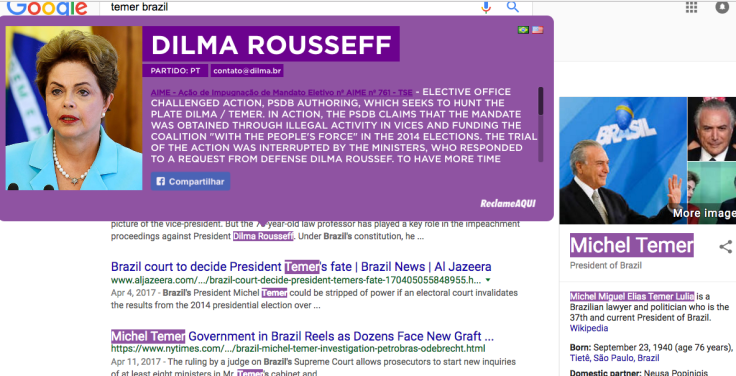Chrome Plug-In Highlights Names Of Corrupt Politicians While You Surf The Web

A Brazilian anti-corruption program is exposing politicians facing charges in a convenient way for voters: a Chrome plug-in.
The Reclame Aqui Institute, which is Brazil’s main consumer complaints platform, launched the project Colour of Corruption two weeks ago. The program aims to inform voters about investigations and charges politicians are facing in the country.
“Regardless of what site you are on, newspaper website or Facebook or Twitter, the name will be highlighted in purple,” Colour of Corruption Director of Operations Iago Bolivar told International Business Times. “When you put your mouse on it, it’ll show you want kind of investigation the politician is involved in.”
The plug-in, using information from Brazil’s legal courts system (which isn’t available to the public), highlights the name of politicians who are or have been investigated, convicted, or involved in illegal government activities.
The names are highlighted in purple when browsing the internet, and users can read an information box when hovering the mouse over the politician’s name. Here’s a screenshot of how the plug-in works using ousted Brazilian President Dilma Rousseff as an example:
The plug-in “transforms any Brazilian internet user’s navigator into a revelation tool,” Colour of Corruption said. The Colour of Corruption hopes to be the main source of public information for the upcoming 2018 and 2020 elections in Brazil.
The program’s goal is to monitor all of the country’s 70,430 political officials by 2020. The program partnered with Catholic Pontificia University of Paraná (PUCPR) to meet the 2020 target.
Only 24 percent of Brazilians trust their governments, according to Edelman Trust Barometer 2017. That’s not an ominous sign for the election next year, in which Brazil will elect a new president, senators, federal and state deputies, governors and vice governors. However, Colour of Corruption said it’s the “ideal moment-in-time” for the program “to become an ally to the Brazilian people.”
Bolivar said the plug-in, which has been downloaded 13,000 times, also helps tackle polarization, since “people only get information about their own group.” Voters tend to stay in a bubble and only read news about their political organization or what they see on their Facebook feed, specifically on a certain party.
It’s also a way to stay informed “on a daily basis” without looking up politicians in the news or online, Bolivar said.
Corruption Plug-In For U.S. Elections?
Colour of Corruption hopes to expand to more countries. The program has received requests from Mexico and Hungary, but Colour of Corruption needs local, reliable partners to take their technology to another country.
Bolivar noted that the plug-in will do well in the U.S., since the elections are closely followed around the world and because the last election marred by fake news.
“We believe that we can fight fake news [with] impartial information. It’s only information, official source from a clerk,” said Bolivar.
“It's for everyone, every party, every level of party,” he added. “We believe it may be important to U.S. elections.”
© Copyright IBTimes 2024. All rights reserved.





















